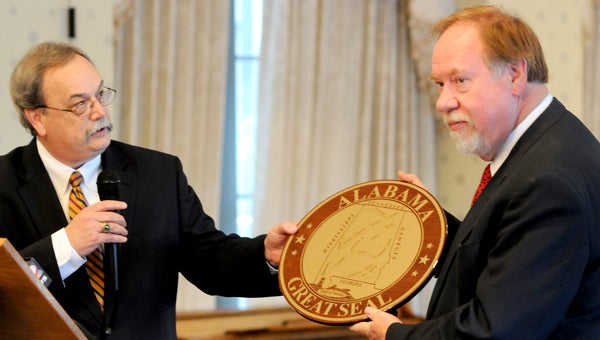Zilkha Biomass to make Selma plant a world’s first
Published 12:15 am Tuesday, May 15, 2012

Gary Faulkner, left, presents Zilkha Biomass CEO John Holmes Jr. with the Alabama Seal during Monday’s press conference announcing the company has agreed to take over the former Dixie Pellet facility on the Alabama River to produce a one-of-a-kind wood pellet. -- Tim Reeves
Conservatives and some economists believe government mandates on industry, tied to protecting the environment, are job killers. While that debate still rages in the United States, government regulations in the European Union are tied to a major industrial announcement made Monday in Selma.
During a press conference and unveiling at the St. James Hotel, Zilkha Biomass Energy announced plans to begin manufacturing wood pellets at the plant once owned by Dixie Pellets.
But while what they will produce is officially called wood pellets, the product coming out of Selma’s plant will be the only one of its kind in the world.
“We own the patent to what is called the black pellet,” Zilkha CEO Jack Holmes Jr. said. “We are the only manufacturer of this in the world, and the only place it will be produced in large quantities will be right here.”
The difference between a normal wood pellet and Zilkha’s Black Pellet is the versatility and the ease in which coal-fired energy plants can use the product.
“This can be stored just like coal. You do not have to worry about moisture or the elements,” Holmes said. “Yes, the cost-per-ton is more than normal wood pellets, but long-term — including transportation costs — our product ends up being less expensive.”
Currently, the company is producing test batches of the black pellet, as much as 40,000 tons per year, to help sell the product to customers in the European Union. But, when the facility is up and running, Holmes is expecting the company to product as much as 275,000 tons per year.
For Holmes, and the area’s economic development team, Monday’s announcement had been a long time coming, and one that was very likely never going to happen.
Zilkha purchased the plant in June 2010, acquiring the equipment out of Dixie Pellet’s bankruptcy.
At the time, Holmes said, the plan was to simply take the equipment out and place it other manufacturing facilities owned by the company.
But, Holmes credits the efforts of Selma-Dallas County Economic Development Authority director Wayne Vardaman, for showing the site on the Alabama River is a viable manufacturing facility, even if barging product up and down the river is currently not an option.
“Our economic outlook is based right now trucking in biomass from the surrounding area and trucking out the finished product,” Holmes said. “If we are able to get the dredging issue solved, then we will look at that, but right now we are going to see about 100 trucks per day coming and going.”
The company is estimating an investment of $45 million in the plan and hopes to be up and running by June or July 2013. Also, construction will begin “immediately.”
What might not happen immediately is an access road Zilkha, International Paper and local leaders desperately need built.
The road would provide direct access to the former Dixie Pellet plant and reduce or eliminate any impact on the already busy truck traffic heading into and from International Paper’s Riverdale Mill.
“Probate Judge Kim Ballard will be addressing a state committee this week, asking for the $2.2 million needed to make this road happen,” Vardaman said. “This is really a crucial component to making this plant the success we expect it to be.”
As for the dredging, Ballard told those gathered he still hopes for Gov. Robert Bentley to come through on the commitment to provide the 3-year, $15 million pledge to have the river properly dredged.
The dredging project, coordinated by the Army Corps of Engineers, would need to be done annually to maintain proper navigation to the Port of Mobile. Funds for dredging have all but dried up in years past thanks to federal budget cuts and the elimination of federal earmarks.
Overall, the company expects to fill 52 full-time positions, working with AIDT to find and train those employees. Vardaman and Holmes also said the facility is expected to have a direct impact in an additional 100 new jobs being created in the region to help maintain a flow of biomass — in this case wood chips — to the plant.
“Throughout the entire process, one of the most important components was the fact that we can expect a consistent supply of biomass to make this facility successful,” Holmes said.
This marks the first commercial scale black pellet facility for Zilkha in the country, but Holmes said this is the first of a number of facilities planned.
“We hope to be able to use this plant as a training ground for future plans,” Holmes said. “As with any first time project, we wanted to take our time and make sure we did it right. I think we are off to a great start.”





